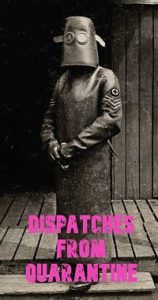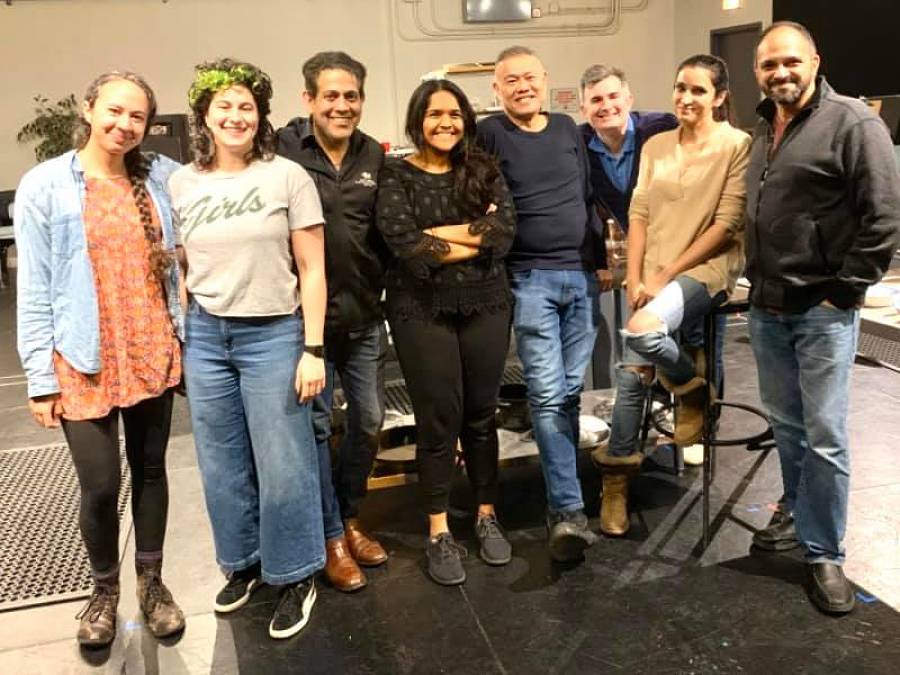 Two weeks into rehearsals, we had to announce the cancellation of the world premiere of Madhuri Shekar’s Dhaba on Devon Avenue. Fortunately, with the support of our Victory Gardens board, we were able to pay out the contracts for our actors and designers. Instead of disbanding the company immediately, we decided to do our first and only run-through for Madhuri so she could see the play she’s been working on in its entirety.
Two weeks into rehearsals, we had to announce the cancellation of the world premiere of Madhuri Shekar’s Dhaba on Devon Avenue. Fortunately, with the support of our Victory Gardens board, we were able to pay out the contracts for our actors and designers. Instead of disbanding the company immediately, we decided to do our first and only run-through for Madhuri so she could see the play she’s been working on in its entirety.
The run was bittersweet, life-affirming, and an unexpected return to home, especially in these uncertain times. It was also community at its finest: local artists creating art for ourselves and with each other. Madhuri had said that Dhaba “is my ode to the quiet heroism and daily struggles that are required to be an artist, an entrepreneur, an immigrant, and a parent.” These themes never rang louder for us than during the run, with the pandemic raging outside the rehearsal room.
In the last weeks, Dhaba gave us the rare opportunity to honor our families and communities. Table work was deeply moving and personal as we all shared the tremendous sacrifices our immigrant families made to make this country their second home. Madhuri’s powerful play is a tribute to anyone who has braved oceans and deserts to reach these United States. I wouldn’t trade the time we spent in the rehearsal room for anything in the world. We’d love to have shared Dhaba with our South Asian community in Chicago, as it’s a valentine and testament to all of them. I know we will celebrate them another time and soon.
Dhaba was to be my final production as artistic director at Victory Gardens, and this play gave me a gift, an unexpected personal sojourn that made me reflect on why I left my native Singapore for a life in American theatre, and the choices I made that led me here to Lincoln Avenue. The cancellation was a deep blow, as I had hoped to end my journey in the same fashion I started my first season: producing a new play by a playwright of color who gives more voice and visibility to our diverse communities in Chicago. Ultimately, this was the responsible and ethical thing to do during this pandemic. The health and well-being of our artists, audiences, staff and production crew were our top priority. It’s what our immigrant and refugee ancestors would have done: Do what is best for the community.
Once the rehearsal room was empty, I plunged back into the realities every theatre leader was wrestling with. How could we ensure our staff’s safety and their salaries throughout these tenuous times? How long do we have wait this out in our own homes? How will it affect our financials? In the world outside our theatre, there were signs of a recession, a government incapable of decisive leadership during a crisis, a potential loss of life and jobs, and the possible closure of institutions and small businesses. There have also been increased physical and verbal assaults on Asian Americans, hatred and racism once again being given a green light by the only true yellow peril tweeting from the White House.

On a personal front, aside from a postponement of a workshop of my play and a directing gig, my older docu-play about 150 years of Asian America, A Beautiful Country, was also cancelled at University of Michigan, Ann Arbor. I was planning to return to freelance directing this coming summer and, like many others, without health insurance nor a clear sense of where the next project will emerge. In Dhaba, the patriarch Neeraj says, “My parents risked everything to come here. They kept getting taken from me one after the other, and I—I can’t just let this go. Everything keeps getting taken from me.”
I was invited to the rehearsals of A Beautiful Country the weekend before. There, I met the next generation of theatremakers—undergraduates brimming with fire and passion, asking question upon question about our field, and exploring new ways of creating work. Sitting through their rehearsals, I revisited my play and I was reminded of the legacy Asian immigrants and refugees have given us. From the harsh realities of Chinese railroad workers to the racist murder of Vincent Chin, from the Japanese internment to the terrifying odysseys of Vietnamese and Cambodian refugees, the message has been clear: We survived so that you will survive.
In these times, I realize I have to look back at our collective past in order to turn toward the future. I tell myself we have endured millennia of plagues, wars, and regimes, and it is only a matter of time before we rise from this current moment in our global history, along with our art and culture. Business might not be as usual for others, but I know we will emerge with new stories to tell. We will revisit old tales that give our lives new meaning and sustenance. We will find innovative ways to see and think. We will found new spaces for our stories; they may again be in shuttered storefronts, church basements, or around the fire, as when we first told stories. New homes will be built by a new generation of American artists, and they will be more equitable and inclusive than our current ones.
We will also find new models of how to produce and create theatre. After hibernation, people will be hungry for human interaction, community, and storytellers around the fire. Having recently directed Lauren Yee’s Cambodian Rock Band about genocide and the state-sanctioned murder of artists, I remain humbled and inspired by their survival against harrowing odds, and the enduring power of art and music. As long as there are people, artists, and a fire, we will always tell stories.
It seems coincidental that our current circumstances almost reflect Dhaba on Devon Avenue’s plot: Neeraj fights the closing of his 30-year-old Sindhi restaurant by insisting on maintaining his authentic menu despite dwindling patronage, changing times, and a looming foreclosure. The bright hope in the play is that his daughter will continue his legacy, but only in her own unique way, fusing modern and the classic cuisines, and collaborating with her estranged sister. I also take comfort from this speech from the play: “You know what is being Sindhi? Adjustment. Like Rita said—evolution. We are like water, we fit into the container that we find ourselves in. How else have we survived? Thrived in every country, when we were forced out of our own.” I can’t help but see our future in Madhuri’s play.
For now, let’s all stay healthy, strong, and safe. We will overcome this. And we will invite communities back into our current and new homes, and share stories of our histories, our hopes, and how we live. We will again tell stories to reflect and represent, and ignite the imaginations of our citizens.
Chay Yew is a playwright and director, and for nearly 9 years he has been the artistic director of Victory Gardens Theater in Chicago.


